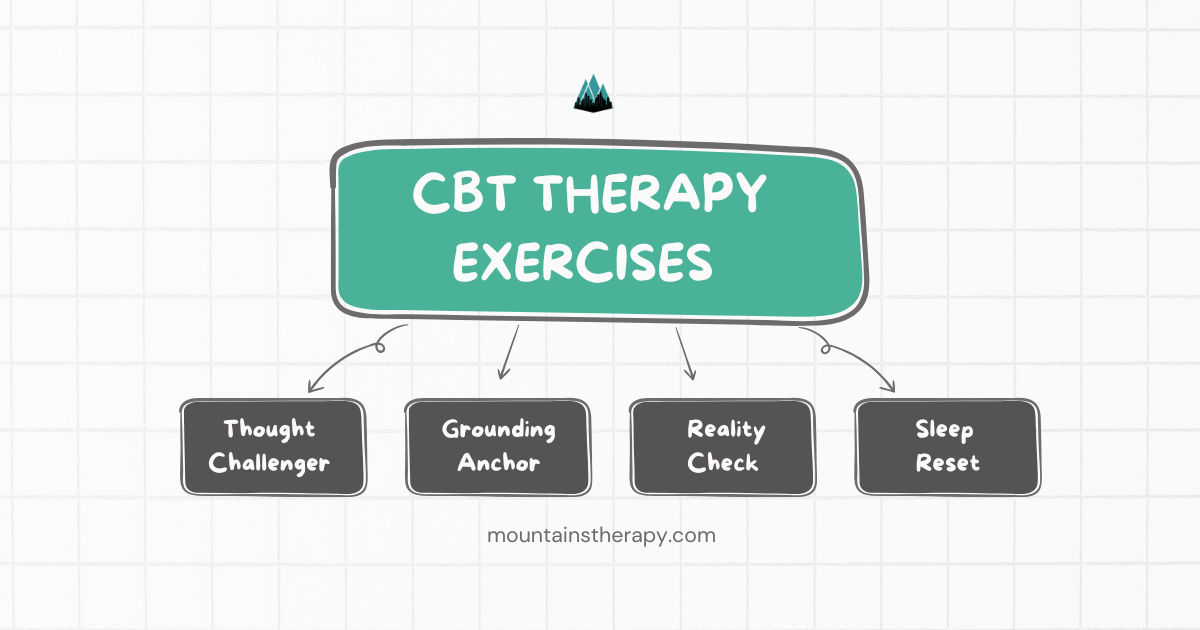CBT Therapy Exercises for When You Feel Anxious, Overwhelmed or Stressed
Learn more about CBT Therapy and Anxiety Therapy.
In This Blog, You’ll Learn:
✅ CBT exercises for anxiety and how they help manage emotions
✅ Cognitive behavioral therapy techniques anxiety specialists recommend
✅ How mindfulness cognitive-based therapy can improve mental clarity
✅ CBT for anxiety disorders and emotional regulation
✅ Where to find CBT treatment near me in NJ
Are You Feeling Anxious, Overwhelmed or Stressed? Try These CBT Therapy Exercises
Life can feel overwhelming at times, leaving us anxious, insecure, or even helpless. Cognitive Behavioral Therapy (CBT) is one of the most effective approaches for managing these feelings. Whether you’re struggling with everyday stress or a diagnosed anxiety disorder, practicing CBT exercises for anxiety can help reframe your thoughts and bring a sense of control back into your life.
At Mountains Therapy in Montclair, NJ, we specialize in CBT for anxiety disorders and tailor interventions to support your emotional well-being. Below, we’ll explore cognitive behavioral therapy interventions for anxiety or and practical exercises you can try today.
1. Cognitive Behavioral Therapy Techniques for Anxiety
CBT Guided Discovery: Challenge Negative Thinking. One of the most effective cognitive behavioral therapy techniques anxiety experts use is CBT guided discovery, a process where you challenge negative thoughts and uncover alternative perspectives.
Exercise: The Thought Challenger
- Write down an anxious thought (e.g., "I’m going to fail at this project").
- Ask yourself: What evidence do I have that this thought is true?
- Consider: What would I tell a friend who felt this way?
- Replace the thought with a balanced one (e.g., "I have handled challenges before and can figure this out").
2. Mindfulness Cognitive Based Therapy: Stay Present
Mindfulness cognitive-based therapy combines CBT with mindfulness to help individuals remain grounded in the present moment.
Learn more about mindfulness therapy near me.
Exercise: The Grounding Anchor
- Close your eyes and take deep breaths, focusing on inhale and exhale sensations.
- Name five things you see, four things you feel, three things you hear, two things you smell, and one thing you taste.
This technique reduces overwhelming thoughts by bringing attention to the present.
3. Cognitive Therapy Anxiety Techniques: Reframe Catastrophic Thinking
Catastrophizing can fuel cognitive behavioral therapy anxiety struggles. This exercise helps shift from worst-case scenarios to more realistic perspectives.
Exercise: The Reality Check
- Identify a distressing thought (e.g., "If I make a mistake at work, I’ll be fired").
- Write out the worst-case, best-case, and most realistic scenario.
Recognizing the most likely outcome helps reduce emotional distress.
4. Behavioral Cognitive Therapy for Insomnia: Create a Nighttime Routine
Poor sleep often worsens anxiety. Cognitive behavioral therapy for insomnia helps individuals reframe unhelpful thoughts about sleep and develop healthy habits.
Exercise: The Sleep Reset
- Establish a relaxing pre-sleep routine (no screens, dim lighting).
- Replace thoughts like "I’ll never fall asleep" with "My body knows how to rest."
- Use cognitive therapy techniques for anxiety or cognitive behavioral therapy for sleeplessness to manage racing thoughts before bed.
What Is Cognitive Behavioral Therapy (CBT)?
CBT is a widely used, evidence-based approach that focuses on identifying and changing negative thought patterns and behaviors. Unlike traditional talk therapy, CBT is structured, goal-oriented, and practical, helping individuals develop coping strategies for managing anxiety, stress, and other mental health concerns. Learning and practicing practicing a CBT exercise for anxiety can help you regulate emotions and regain control. cbt exercises for anxiety
How Does CBT Work?
Cognitive therapy for anxiety techniques helps individuals:
- Recognize and challenge unhelpful thoughts.
- Develop healthier coping mechanisms for stress and anxiety.
- Practice behavioral strategies that reinforce positive thinking and resilience.
- Learn problem-solving techniques to improve emotional well-being.
CBT is highly effective for a range of mental health issues, including cognitive behavioral therapy for insomnia, cognitive therapy techniques for anxiety, and other emotional challenges.
Who Created Cognitive Behavioral Therapy?
Many people ask, "Who is the founder of cognitive behavioral therapy?" Dr. Aaron Beck, a psychiatrist who developed cognitive behavior therapy in the 1960s. The cognitive behavior therapy founder did research and laid the foundation for modern cognitive behavioral therapy interventions for anxiety and other mental health challenges.
Where to Find Cognitive Behavioral Therapy Near Me in Montclair, NJ
If you're searching for CBT treatment near me or cognitive behavioral therapy near me, Mountains Therapy offers evidence-based approaches tailored to your needs. Our licensed therapists specialize in CBT for anxiety disorders, stress management, and cognitive behavioral therapy for insomnia to help clients improve their emotional well-being. Ready to regain control over anxiety? Reach out to us today to book a session in Montclair, NJ!











